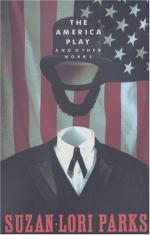
|
| Name: _________________________ | Period: ___________________ |
This quiz consists of 5 multiple choice and 5 short answer questions through Section 2, Imperceptible Mutabilities in the Third Kingdom, Part 2.
Multiple Choice Questions
1. Who is being observed by a cardboard cockroach in "Snails"?
(a) Molly and Charlene.
(b) Molly and Veronica.
(c) Veronica and Charlene.
(d) Chona and Vero.
2. Who defied her boss' efforts to get her to speak properly in scene "A" of "Snails"?
(a) Chona.
(b) Verona.
(c) Charlene.
(d) Molly.
3. In "Snail," scene "C," Molly announces her decision to not make a career out of what?
(a) Blackmail.
(b) Hopelessness.
(c) Begging.
(d) Being down and out.
4. In scene "A" of "Snails," Molly insistently asks Charlene where what are?
(a) Her shoes.
(b) Her dress.
(c) Family photographs.
(d) The want ads.
5. For what play did Parks receive the 2002 Pulitzer Prize for Drama?
(a) Locomotive.
(b) The Sinner's Place.
(c) Topdog/Underdog.
(d) In The Blood.
Short Answer Questions
1. Who speaks of developing an unusual friendship with a robber who repeatedly came to her house in scene "A" of "Snails"?
2. In scene "B" of "Open House," Aretha speaks of God looking down on whom?
3. What is an art form that generally refers to movement of the body, usually rhythmic and to music, used as a form of expression or presented in a spiritual or performance setting?
4. What refers to a musical tradition and style of music that originated at the beginning of the 20th century in African American communities in the Southern United States from a confluence of African and European music traditions?
5. Who works with Aretha on the calculations for how many slaves can fit in the bottom of a transport ship in scene "B" of "Open House"?
|
This section contains 262 words (approx. 1 page at 300 words per page) |

|




